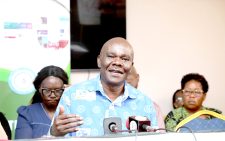Global leaders cautious after election powered by Donald Trump’s America First protectionism mantra

With Donald Trump’s sweeping election victory Tuesday, the world is now preparing for another four years of unpredictability and “America First” protectionism that could reset the ground rules of the global economy, empower autocrats and erase U.S. protection for democratic partners.
Although foreign affairs proved largely absent from the campaign, Trump has made several statements that — if turned into policy — would transform America’s relationship with both allies and adversaries. He has pledged to end the war in Ukraine in 24 hours, a promise many assume amounts to the withdrawal of U.S. aid for Ukraine, which would benefit Russia.
More broadly, he has vowed to make the world’s most powerful country more isolationist, more combative with tariffs, more openly hostile to immigrants, more demanding of its security partners, and less engaged on global challenges such as climate change.
Many believe the impacts could be greater than anything seen since the start of the Cold War.
“It accelerates the already deep trend of an America looking inward,” said James Curran, a professor of modern history at the University of Sydney. “Allies are going to have to save the multilateral furniture while it’s still around — they have to hope that America buys back in.”
By now, after witnessing his first term, the world already knows that the only certainty with Trump is uncertainty. He has often said that keeping the world guessing is his ideal foreign policy.
Senior officials around the world tried to stress elements of their relations with the United States that would endure.
In Mexico, President Claudia Sheinbaum said Wednesday that there would be “good relations” with the United States, despite Trump’s recent threats to impose mammoth tariffs on her country. “There is no reason to worry,” she said. “Mexico always comes out ahead.”
Foreign Minister Antonio Tajani of Italy told Sky News he believed Trump had “a natural sympathy for Italy.” He said he was “convinced that we will work well with the tycoon’s new administration.”
In Kenya, Ndindi Nyoro, a lawmaker with President William Ruto’s governing coalition, said he thought Trump’s economic policies would be better for African countries, many of which are struggling with growing inflation and crushing debt.
India has also been watching the U.S. contest with little concern, trusting that as the world’s most populous nation and fifth-largest economy, it would still be courted as a counterweight to China.
Trump had a combative relationship with the United Nations during his first term, slashing money for a range of issues including peacekeeping, the Palestinians and women’s rights, although the U.S. remained the top donor. In congratulating Trump on his win this time, U.N. Secretary-General Antonio Guterres called cooperation with the United States “an essential pillar of international relations.”
Trump’s isolationist campaign themes have already put many nations on edge.
China, with its own economy in the doldrums, faces likely broader and higher tariffs than those applied during Trump’s first term and continued by President Joe Biden. Shi Yinhong, an international relations professor at Renmin University in Beijing, said a second Trump presidency would “inevitably diminish global trust and respect for the United States.”
Few of China’s neighbors, wary of Beijing, see cause for celebration in Trump’s victory.
South Korea and Japan expect to be pressured into paying more to have U.S. troops based in their countries. Trump has pledged to make South Korea pay $10 billion annually; it currently pays a little over $1 billion.
Some diplomats in Asia have said that with Trump in power, they also expect China to intensify pressure on Taiwan, if not invade the self-governing island it claims as its territory. In their view, China may calculate that Trump would not go to war for a democracy that he has accused of “stealing” the microchip industry from the United States.
People on the island, where Trump was well-regarded in his first term, have become less sure that he can be trusted.
“With Donald Trump, there are large amounts of uncertainty,” said Lev Nachman, a political scientist at National Taiwan University in Taipei. “And it’s a matter of uncertainty that comes with great risk for Taiwan.”
For Ukraine, Trump’s return means a fog of additional danger. His claim that he will be able to broker an end to the war












